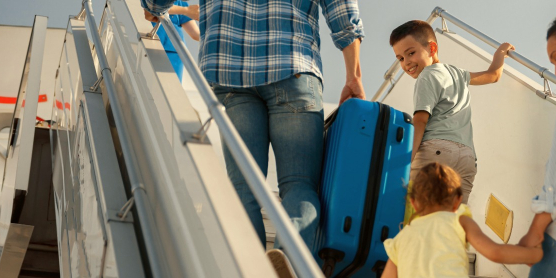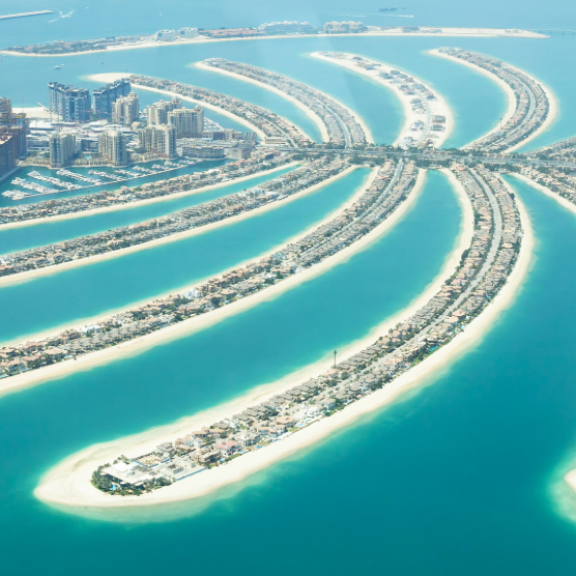
Emigrate to Dubai and Abu Dhabi
Learn the most important information about the destination country for your time in the United Arab Emirates
The United Arab Emirates is a state on the Arabian Peninsula. It is mainly inhabited in the area on the Persian Gulf. The country consists of a federation of 7 emirates. In Abu Dhabi, the capital located on an island, is the Sheikh Zayed Mosque with crystal chandeliers and space for 40,000 worshippers. Dubai is home to the ultra-modern Burj Khalifa, huge shopping malls and extravagant entertainment complexes. For people looking to emigrate to Dubai, the city offers a modern infrastructure, a luxurious lifestyle, diverse career opportunities and a dynamic cultural environment.
Facts about the United Arab Emirates
Capital City
Abu Dhabi
Population
9.365 million
Surface Area
51,946.632 mi² or 83,600 km²
Continent
Asia
Official Language
Arabic
Currency
UAE-Dirham
Emigrating to Dubai: An overview of the political system
Emigrating to Dubai means living in a federal system in which the rulers of the seven emirates, including Dubai, elect the president. While the federal government is responsible for foreign and security policy issues, the emirates like Dubai enjoy extensive autonomy in economic and cultural areas. Public life in the UAE offers a certain degree of liberalism in terms of women's rights and religious freedom, but civil rights such as freedom of the press and freedom of assembly, as well as the rights of foreign workers, are restricted. Emigrating to Dubai therefore means benefiting from a modern and diverse society, but with certain restrictions in terms of political freedom.
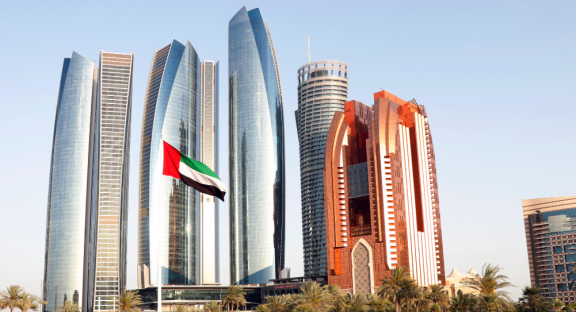
Climate in Dubai: Important information for emigrants
Emigrating to Dubai means getting used to a hot, tropical to subtropical climate, where temperatures regularly rise above 40°C in summer. In the windless inland regions, they can even reach over 50°C. In the hot summer months, many people spend their time in air-conditioned indoor spaces, such as the Dubai Mall, which is cooled down so much that you can go ice skating and visit an indoor ski slope. So emigrating to Dubai means adjusting to the hot climate, but also having access to modern conveniences in air-conditioned spaces.

Healthcare system in Dubai: Important facts for emigrants
Expatriating to Dubai means getting to grips with the healthcare requirements of the United Arab Emirates (UAE). The country offers high-quality medical services in both the public and private sectors. However, costs in the private sector are high and rising every year. For expats emigrating to Dubai, a comprehensive medical examination is required to qualify for a residence visa. This examination includes x-rays and blood tests. Individuals with tuberculosis or HIV/AIDS will be disqualified.
Public health care
Expatriating to Dubai also means familiarizing yourself with the UAE's public healthcare system. The public medical facilities are well organized and offer a high standard of care that is geared towards the needs of the local population. However, due to high demand, they can be overcrowded, making it difficult for expats emigrating to Dubai to find their way around. Those wishing to use the public healthcare system must apply for a health card from the Ministry of Health, either online or directly from a health center.
Private healthcare
Emigrating to Dubai also means dealing with the healthcare system. In the United Arab Emirates (UAE), private healthcare facilities that offer state-of-the-art medical care now predominate. The medical staff, who often come from abroad, are excellently trained and generally speak good English. Nevertheless, private hospitals do not always offer treatment for serious injuries and complex emergencies, which are reserved for public hospitals. Those wishing to emigrate to Dubai are required by law to take out private health insurance in some emirates such as Abu Dhabi and Dubai. Employers are usually required to contribute to these insurance policies. It is recommended that expats emigrating to Dubai take out comprehensive health insurance before their arrival.

Emigrating to the Emirates: An overview of the economic situation and quality of life
In 2024, the United Arab Emirates had a gross domestic product per capita of 51,294.32 US dollars. The Gini coefficient of wealth describes the distribution of wealth. The indicator is an established, internationally comparable measure of wealth inequality. It is measured on a scale from zero to one. The higher the value, the greater the inequality. The Gini coefficient in the United Arab Emirates is expected to be 0.25 in 2025 (source: Statista).
It is estimated that around 10,000 Germans live in the United Arab Emirates (UAE), of which around 2,000 are based in the Emirate of Abu Dhabi. More than 800 German companies have branches or subsidiaries here. In addition to a flourishing economy, the country also offers fairly comfortable living conditions, although these are affected by an extremely hot and humid climate in summer. During this time of year, it is almost impossible to live outdoors, but all public and private buildings are air-conditioned. The infrastructure is extremely well developed and there is an adequate, albeit rather expensive, housing market compared to Germany. There are also German schools in Abu Dhabi, Dubai and Sharjah. For people who want to emigrate to Dubai, the emirate offers not only professional opportunities through the large number of German companies, but also a comfortable living environment and German educational institutions for families with children. Those looking to emigrate to Dubai will find a modern, international environment with many amenities.
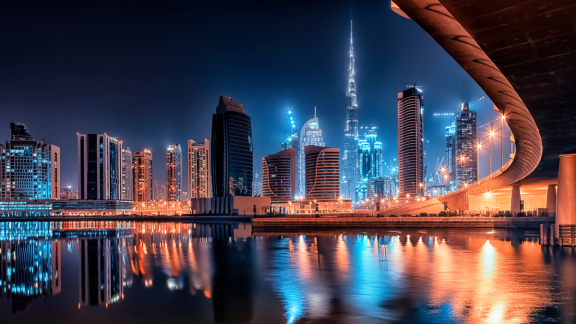
National holiday
Spirit of the Union
is derived from the historic meeting of the late Sheikh Zayed bin Sultan Al Nahyan, founding father of the United Arab Emirates.
Demographic
With a population of just under 10 million, only 10% have citizenship. Sharia law is still the main source of legislation for the population. Those wishing to emigrate to Dubai should be aware that the legal system is heavily influenced by Sharia law. For expats emigrating to Dubai, it is important to respect the local laws and cultural norms in order to successfully integrate into life in the United Arab Emirates.

Emigrate to Dubai - Entry Requirements
Entry is possible for German nationals with the following documents:
- Passport: Yes
- Temporary passport: No
- Identity card: No
- Temporary identity card: No
- Children's passport: Yes, only if not extended

FAQs for emigrating to the Emirates
Where can I find relevant information about my country of entry and the entry regulations that apply there?
We have compiled destination country information as well as entry requirements and customs information for many countries in the Relocation Service section of our website and are constantly expanding this section.
Can I use my own container that I already own for the move with DACHSER & KOLB?
For every removal, which we at DACHSER & KOLB always offer as a door-to-door (full service) removal, a container is rented for the duration of the removal. We therefore do not offer the option of using your own container.
Who is responsible for my move abroad and the services I need there?
As a FIDI member, we work abroad with selected, long-standing partners who work in accordance with our service standards.
Are my removal goods insured in the event of damage?
For every overseas move, we naturally cover transportation insurance at current value for the used household goods and personal belongings
What types of transportation do you offer for overseas relocation?
It is generally possible to carry out overseas removals via air freight or sea freight. In the case of sea freight, it is possible to ship the removal goods as additional cargo (“LCL shipment” with Liftvan) or with a container (FCL shipment in 20 feet, 40 feet or 40 feet high cube). We will be happy to discuss which option is best for you in a personal consultation.
When and how must the move be paid for and what is the payment deadline?
You will receive an invoice a few weeks after placing the order and pay the full amount directly in advance.
Do I have to pay taxes and customs duties on my removal goods?
Removal goods can be imported tax and duty-free into most countries if you have a valid residence permit. We will be happy to check the options for importing the removal goods for your desired destination country in a personal consultation.
Are you interested in moving to United Arab Emirates or another destination country?
Then do not hesitate and contact us today.
Sabrina Klier
Customer Service & Sales - AIR & SEA



